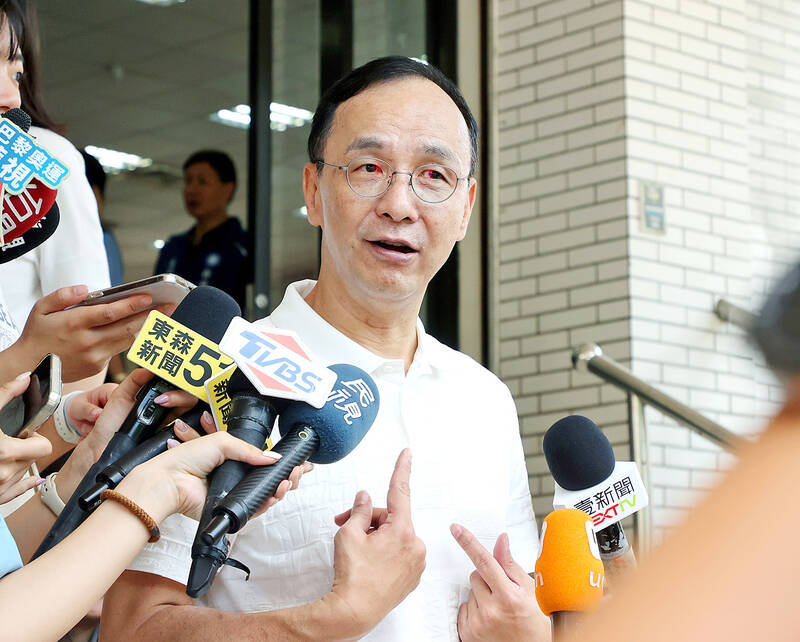The Taiwan People’s Party (TPP) and Chinese Nationalist Party (KMT) caucuses would invite President William Lai (賴清德) to give a state of the nation address at the legislature following pre-legislative reform bill rules, opposition leaders said yesterday.
Their comments came one day after the Constitutional Court issued an injunction against a part of the controversial revisions to the Act Governing the Legislative Yuan’s Power (立法院職權行使法) and the Criminal Code, which were passed in late May, was signed by the president on June 24 and came into effect on June 26.
The President, the Executive Yuan, the Control Yuan and the Democratic Progressive Party (DPP) legislative caucus separately filed for a constitution interpretation and injunction to halt the implementation of the amended laws.

Photo: CNA
The DPP caucus said the opposition should heed the court’s warning, but added that Legislative Speaker Han Kuo-yu (韓國瑜) is entitled to negotiate the matter at the Legislative Yuan.
Earlier that day, TPP caucus whip Huang Kuo-chang (黃國昌) said the court’s ruling on amendments to Article 15 of the act did not abolish the right of lawmakers to request the president’s presence.
This means the Legislative Yuan can ask questions that the president may choose to respond to, he said, adding that Lai should make good on the promises he made on the campaign trail to work with lawmakers.
Huang also accused the government of judicial impropriety, saying: “The Constitutional Court trampled the law to serve the DPP.”
That DPP spokesman Justin Wu (吳崢) knew the court would issue an injunction and when it would happen showed there was a breach of confidentiality rules, he said.
The court’s decision went against the precedent established by Constitutional Interpretation No. 585, he added.
The grand justices’ ruling failed to address the standing issue raised by the Legislative Yuan during the statement of opinion, showing the decision had been pre-prepared, Huang said.
On the sidelines of a panel on legislative reform in New Taipei City, KMT Chairman Eric Chu (朱立倫) said the DPP’s foreknowledge of the ruling was evidence of impropriety.
The power to investigate and call witnesses to hearings is the same right and privilege enjoyed by lawmakers in democracies around the world, he said.
Asked about Chu and Huang’s comments, DPP caucus secretary-general Rosalia Wu (吳思瑤) said the DPP party anticipated the court’s ruling because hundreds of lawyers said the bill amounted to an unconstitutional power grab.
The timing of the decision was transparent to anyone with a passing familiarity of the court’s schedule, she said.
On the TPP and KMT’s proposed invitation, Wu said the court’s injunction permits lawmakers to invite the president to the legislature, but not to dictate the terms of the exchange.
“The ruling flashed a stop sign that the opposition should do well to heed before charging headlong across the railroad,” she said.

Chinese Nationalist Party (KMT) Chairman Eric Chu (朱立倫), spokeswoman Yang Chih-yu (楊智伃) and Legislator Hsieh Lung-chieh (謝龍介) would be summoned by police for questioning for leading an illegal assembly on Thursday evening last week, Minister of the Interior Liu Shyh-fang (劉世芳) said today. The three KMT officials led an assembly outside the Taipei City Prosecutors’ Office, a restricted area where public assembly is not allowed, protesting the questioning of several KMT staff and searches of KMT headquarters and offices in a recall petition forgery case. Chu, Yang and Hsieh are all suspected of contravening the Assembly and Parade Act (集會遊行法) by holding

PRAISE: Japanese visitor Takashi Kubota said the Taiwanese temple architecture images showcased in the AI Art Gallery were the most impressive displays he saw Taiwan does not have an official pavilion at the World Expo in Osaka, Japan, because of its diplomatic predicament, but the government-backed Tech World pavilion is drawing interest with its unique recreations of works by Taiwanese artists. The pavilion features an artificial intelligence (AI)-based art gallery showcasing works of famous Taiwanese artists from the Japanese colonial period using innovative technologies. Among its main simulated displays are Eastern gouache paintings by Chen Chin (陳進), Lin Yu-shan (林玉山) and Kuo Hsueh-hu (郭雪湖), who were the three young Taiwanese painters selected for the East Asian Painting exhibition in 1927. Gouache is a water-based

Taiwan would welcome the return of Honduras as a diplomatic ally if its next president decides to make such a move, Minister of Foreign Affairs Lin Chia-lung (林佳龍) said yesterday. “Of course, we would welcome Honduras if they want to restore diplomatic ties with Taiwan after their elections,” Lin said at a meeting of the legislature’s Foreign Affairs and National Defense Committee, when asked to comment on statements made by two of the three Honduran presidential candidates during the presidential campaign in the Central American country. Taiwan is paying close attention to the region as a whole in the wake of a

OFF-TARGET: More than 30,000 participants were expected to take part in the Games next month, but only 6,550 foreign and 19,400 Taiwanese athletes have registered Taipei city councilors yesterday blasted the organizers of next month’s World Masters Games over sudden timetable and venue changes, which they said have caused thousands of participants to back out of the international sporting event, among other organizational issues. They also cited visa delays and political interference by China as reasons many foreign athletes are requesting refunds for the event, to be held from May 17 to 30. Jointly organized by the Taipei and New Taipei City governments, the games have been rocked by numerous controversies since preparations began in 2020. Taipei City Councilor Lin Yen-feng (林延鳳) said yesterday that new measures by